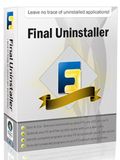Zilnic oferim programe licențiate GRATUITE pe care altfel ar trebui să le cumpărați!

Giveaway of the day — Advanced Defrag
Advanced Defrag a fost chilipirul zilei în 18 august 2010
Advanced Defrag este un program premiat, conceput pentru a mări viteza de răspuns a computerului şi pentru a păstra computerul ca nou. Acest program poate analiza complet şi amănunţit computerul şi poate defragmenta hard disk-urile şi registrii Windows pentru a maximaliza astfel performanţa computerului şi a eficientiza lucrul la computer.
Trăsături cheie:
- Analiză amănunţită şi defragmentare rapidă şi aprofundată
- Suport pentru defragmentarea regiştrilor
- Defragmentare în timp real
- Opţiune de programare automată a defragmentării
- Suportă defragmentare prin dispozitive USB externe
- Analiză detaliată a stilului web şi raport de defragmentare
- Portabil, intuitiv şi uşor de folosit
Cerinţe minime de sistem:
Windows ME/ 2000/ 2003/ XP/ Vista/ 7
Publicist:
FastmulePagina de pornire:
http://www.advanceddefrag.com/Dimensiunile fişierului:
10.3 MB
Preţ:
$34.95
Titluri promovate

Final Uninstaller vă pune la dispoziţie o soluţie simplă şi cuprinzătoare pentru dezinstalarea programelor nedorite, fie că sunt cele instalate corect şi funcţionale, fie că sunt programe pentru care procesul de dezinstalare a eşuat. Mai mult, Final Uninstaller vă oferă Junk Files Cleaner, Registry Cleaner, Disk Defragmenter şi alte instrumente folositoare care vă pot ajuta să optimizaţi computerul prin înlăturarea fişierelor nedorite, prin curăţarea regiştrilor şi defragmentarea hard disk-urilor.

Convert Genius este un program de convetire DVD/video complet care poate converti uşor şi eficient format video în majoritatea formatelor cunoscute, precum: AVI, MP4, FLV, Xvid, WMV, DivX, MPEG, MOV, VOB, etc. , la o calitate superioară şi la o viteză mare. Astfel că vă puteţi bucura de orice video oriunde, inclusiv de distribuirea lui pe internet, în pagini web sau bloguri, pe DVD playere şi pe playere portabile cum sunt iPod, iPhone, PSP, BlackBerry, Zune, Apple TV, Mobile 3GP, etc.

Comentarii la Advanced Defrag
Please add a comment explaining the reason behind your vote.
I decided not to conduct a full review on the software because of the questionable nature of the software; rather I would like to issue a couple of words of caution: The developer of Advanced Defrag is known to distribute malware/rogue software.
AdvancedDefrag.com - the homepage for Advanced Defrag - has poor reputation on WOT and SiteAdvisor primarily based off an hpHosts blacklist which claims AdvancedDefrag.com is "used for the distribution of 'rogue' security or other such applications." Because of past experience with hpHosts and the lack of proof to back their claims (hpHosts just tell you a website is bad, they don't provide proof as far as I can find), I have learned to take hpHosts ratings as an opinion rather than fact unless the ratings are backed by scan results or by other sources. (Indeed, Softpedia has given Advanced Defrag a "100% clean" rating, and SiteAdvisor says it found "one green download" on the website but does not specify what the download is.) So, AdvancedDefrag.com's reputation alone is not enough reason to completely blacklist this program, in my opinion. However, when one takes a look at Cheesesoft.com - the homepage of Cheese Software Inc, the developer of Advanced Defrag - there is more than sufficient reason to avoid this program like the plague.
Saying Cheesesoft.com has a terrible reputation on WOT and SiteAdvisor is an understatement. Although SiteAdvisor says there are "5 clean downloads" (and no infected ones) on Cheesesoft.com, there are five comments - based off three sources, one being hpHosts - identifying Cheesesoft.com as a malware and/or phishing threat. On WOT, it is even worse: There are 47 comments claiming Cheesesoft.com has malware content and/or is a phishing threat and/or uses browser exploits; as with the SiteAdvisor comments, the ratings are based off more than one source although primarily the same three sources as the ones in the SiteAdvisor comments are used.
So, in the end, I am sure the GOTD team has properly vetted the software to ensure it is malware free, but download this program at your own risk. In my not-so-humble opinion, the risk of using a program from a questionable developer (to say the least) is not worth the reward considering disk and registry defragger can be found a dime a dozen.
Looking for quality - and free - defraggers? See Auslogics Disk Defrag or MyDefrag for your disk defragmentation needs. (I am a fan of Auslogics Disk Defrag, but both are great defraggers.) For registry defragmentation, NTREGOPT or QuickSys RegDefrag are good choices. (Most people will probably prefer QuickSys RegDefrag because of its superior user-friendliness.)
As always, stay safe!
NOTE: Here on GOTD the developer of this software is listed as "FastMule". However, everywhere else the developer is listed as Cheese Software Inc. (including Softpedia); and if you do a WHOIS on AdvancedDefrag.com and Cheesesoft.com you will see they are registered to the same e-mail address.
Save | Cancel
OK, I have to weigh in on this. I couldn't care less what Ashraf's groupies think, so spare me your mindless comments. In the first place, Ashraf doesn't have the technical ability to evaluate this type of software. But to the point today, he lacks the ability to even evaluate crap like WOT and SiteAdvisor. Those are based on random user comments, much like those here, which don't have anything to do with anything. The fact is, SiteAdvisor says the downloads are safe. TrendProtect, far more reliable than those others, says AdvancedDefrag.com is safe. Google says it's safe. Robtex says it's not listed on any blacklists. And to all of those idiots posting crap at WOT and SiteAdvisor based on hpHosts' classifications, hpHosts themselves says don't do it, and that many of the classifications are false positives.
So, Advanced Defrag isn't malware, but I'm not going to test it. It doesn't say whether it uses the Windows Defragmentation API, which is the only safe method. Using the API doesn't guarantee safety. There are files which cannot be moved, and moving them can brick your computer until you reinstall the OS. I only trust the commercial packages which have enterprise customers to have extensive lists of unmovable files. Advanced Defrag's website says, "It applies advanced defragment algorithm which is able to finish any disk analyze within 1 minute, and it will take no more than 20 minutes to finish any defrag action on any disk volume." It's not possible to defragment a heavily fragmented, largely full 2TB drive in 20 minutes. Their comparison table is useless. "Registry defrag" is pointless and dangerous. The registry files can be physically defragmented, but internal/logical defrag is unnecessary and dangerous (probably XP, certainly Vista and higher do it automatically).
I give Raxco PerfectDisk 11 Professional a mild recommendation. It's Microsoft-certified on all platforms, it supports VSS, and it defragments and optimally places file tables, system files, and the paging file. Code quality has gone down the toilet, I get the impression that a high-school student is their only coder, and they blow off all bug reports except those which actually trash your disk, but it's still better than the competition.
As to whether you should be using a disk defragmenter other than what comes with Windows, yes, because Windows doesn't defragment the page file, which is the most critical thing to do. Unlike what mike has said recently, having Windows automatically create the page file in no way guarantees that it's defragmented. On Vista and higher, you should specify a fixed-size pagefile, so that Windows won't delete it, and a defragmenter which is capable of defragmenting the pagefile will be able to do so. For general defragmentation, there are differences between defragmenters in terms of file placement algorithms, overhead, VSS compatibility, etc. Specifying multiple pagefiles on volumes which are on different physical disks can be very helpful when one disk is busy. Don't give a pagefile its own partition. Fragmentation only matters for those files which you're actually using, and even then it has to be pretty severe to have an impact. The pagefile is always critical.
Save | Cancel
There are some free defrag tools you can use that are safe :
JKDEFRAG
DEFRAGGLER
AUSLOGICS DISKDEFRAG FREE EDITION
I dont like the built in defrag on any windows since its painfully slow!
Save | Cancel
Pros:
UI is clean
Analysis of D: (small data drive) 50GB/80 used) took 20 seconds. (mostly Large 1+GB files)
Cons:
Analysis of C: (OS drive) (40GB/70GB used) took over 2 minutes.
Analysis window pops up full-screen.
Stop Defrag button DOES NOT work.
I hit the close button and it said it would stop and close, hopefully no data was lost.
Suggestions:
Fix the stop button.
Drives shouldn't be able to be checked during a defrag.
Analysis window pops up fullscreen (possibly could be reconsolidated into a smaller cleaner window that doesn't go fullscreen)
Analysed one of my drives and got a report of "percentage of fragments is low" no percentage? (atleast give something better then "low", perhaps less then 1%)
The amount of used blocks compared to % of harddrive used doesn't look quite right. (It shows a lot more free space then there is)
Clicking "drags" the window even when clicking on the data blocks (would prefer it wouldn't)
What is the difference between "defrag" and In-depth Defrag" ? (quick user guide would be helpful, I don't like clicking magic buttons and hoping they do what I want)
I would like to be able to see graphically where files are being moved from/to.
Want to do something no one else has, add a webui.
OS:Windows 7 Ultimate 64 bit
Save | Cancel
I already have specialist tools to do the job that this program does but wanted to add a suggestion for an improvement which I don't believe any other software has but would improve the speed of users PC's.
The biggest problem that causes slowdown, in my experience, is when a user installs a new security software without fully removing the previous one. Several security suites leave numerous items behind even after being uninstalled which cause conflicts with the new software.
It would be brilliant if there was an option to obtain a list of all security suites that are installed/not fully removed. A link to the relevant removal tool for those suites could then be provided or an option for the software itself to remove leftover parts of any security suites the user no longer requires.
It would also be beneficial if, before the defragmentation commences, the software offered to empty unnecessary temporary files from the main temp folders as this would speed up the defragmentation process as well as freeing up space for the user.
Save | Cancel